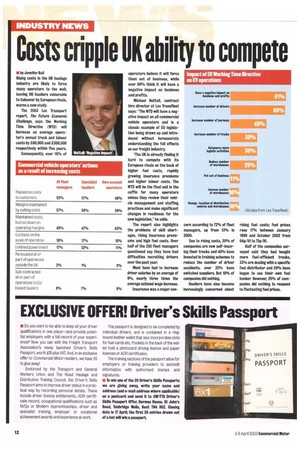Costs cripple UK ability to compete
Page 12

If you've noticed an error in this article please click here to report it so we can fix it.
w by Jennifer Ball
Rising costs in the UK haulage industry are likely to force many operators to the wall, leaving UK hauliers vulnerable to takeover by European rivals, warns a new study.
The 2003 Lex Transport report, The Future Economic Challenge, says the Working Time Directive (WTD) will increase an average operator's annual truck and labour costs by £60,000 and £300,000 respectively within five years.
Consequently, over 10% of operators believe it will force them out of business, while over 60% think It will have a negative impact on business and profits.
Michael Matta, contract hire director at Lex Transfieet says: The WTD will have a negative impact on all commercial vehicle operators and Is a classic example of EU legislation being drawn up and introduced without bureaucrats understanding the full effects on our freight industry.
The UK is already finding it hard to compete with Its European rivals on the back of higher fuel costs, rapidly growing insurance premiums and higher labour costs. The WTD will be the final nail in the coffin for many operators unless they review their vehicle management and staffing practices and make significant changes in readiness for the new legislation," he adds.
The report also highlights the problems of skill shortages, rising insurance premiums and high fuel costs. Over half of the 250 fleet managers questioned say they have had difficulties recruiting drivers over the past year.
Most have had to Increase driver salaries by an average of 9%, nearly three times the average national wage increase.
insurance was a major con
cern according to 72% of fleet managers, up from 51% in 2000.
Due to rising costs, 20% of companies are now self-insuring their trucks and 40% have invested in training schemes to reduce the number of driver accidents; over 25% have switched suppliers. But 10% of companies did nothing.
Hauliers have also become increasingly concerned about rising fuel costs; fuel prices rose 17% between January 1999 and October 2002 from 64p/lit to 75p/Rt.
Half of the companies surveyed said they had bought more fuel-efficient trucks, 33% are dealing with a specific fuel distributor and 20% have begun to use their own fuel bunker. However, 25% of companies did nothing to respond to fluctuating fuel prices.
































































































































































